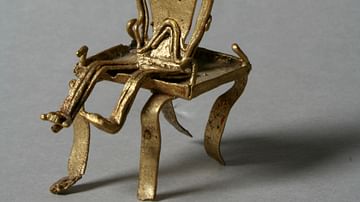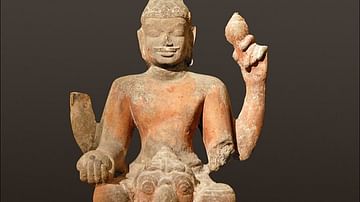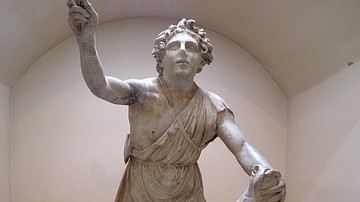Search Definitions
Browse Content (p. 244)

Definition
Gandhara Civilization
The Gandhara Civilization existed in what is now Northern Pakistan and Afghanistan from the middle of the 1st millennium BCE to the beginning of the 2nd millennium CE. Although multiple major powers ruled over this area during that time...

Definition
Muisca Civilization
The Muisca (or Chibcha) civilization flourished in ancient Colombia between 600 and 1600 CE. Their territory encompassed what is now Bogotá and its environs and they have gained lasting fame as the origin of the El Dorado legend. The Muisca...

Definition
Aihole
Aihole (Ayyavole) was an ancient walled city in Karnataka, central India. Aihole was the first regional capital of the Karnakata region under the rule of the Chalukyas. The large number of early Hindu temples and shrines at the site mostly...

Definition
Egyptian Hieroglyphs
The Egyptian hieroglyphic script was one of the writing systems used by ancient Egyptians to represent their language. Because of their pictorial elegance, Herodotus and other important Greeks believed that Egyptian hieroglyphs were something...

Definition
Garuda
Garuda is a bird creature from Hindu mythology that has a mix of eagle and human features. He is the vehicle (vahana) of Vishnu and appears on the god's banner. Garuda represents birth and heaven, and is the enemy of all snakes. In Indian...

Definition
White Huns (Hephthalites)
The White Huns were a race of largely nomadic peoples who were a part of the Hunnic tribes of Central Asia. They ruled over an expansive area stretching from the Central Asian lands all the way to the Western Indian Subcontinent. Although...

Definition
Draco's Law Code
Draco was an aristocrat who in 7th century BCE Athens was handed the task of composing a new body of laws. We have no particular clues concerning his life and general biography and the only certainty is that, as an aristocrat and an educated...

Definition
Mithraism
The Mithraic Mysteries, also known as Mithraism, were a mystery cult in the Roman world where followers worshipped the Indo-Iranian deity Mithras (Akkadian for "contract") as the god of friendship, contract and order. The cult first appeared...

Definition
Katas Raj
The Katas Raj Temples near Chakwal in Punjab province of Pakistan are attributed to the eras of the Hindu Shahis (kings) dating from about 615-950 CE and are dedicated to Lord Shiva. As such they constitute one of the most important Hindu...

Definition
Indus Script
The Indus Script is the writing system developed by the Indus Valley Civilization and it is the earliest form of writing known in the Indian subcontinent. The origin of this script is poorly understood: this writing system remains undeciphered...